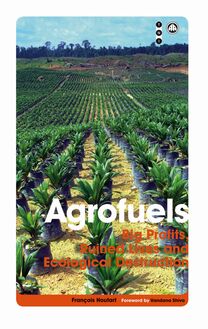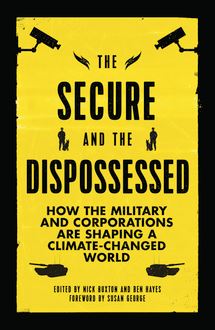-
 Univers
Univers
-
 Ebooks
Ebooks
-
 Livres audio
Livres audio
-
 Presse
Presse
-
 Podcasts
Podcasts
-
 BD
BD
-
 Documents
Documents
-
- Cours
- Révisions
- Ressources pédagogiques
- Sciences de l’éducation
- Manuels scolaires
- Langues
- Travaux de classe
- Annales de BEP
- Etudes supérieures
- Maternelle et primaire
- Fiches de lecture
- Orientation scolaire
- Méthodologie
- Corrigés de devoir
- Annales d’examens et concours
- Annales du bac
- Annales du brevet
- Rapports de stage
La lecture à portée de main
209 pages
English
Découvre YouScribe en t'inscrivant gratuitement
Je m'inscrisDécouvre YouScribe en t'inscrivant gratuitement
Je m'inscris
Obtenez un accès à la bibliothèque pour le consulter en ligne
En savoir plus
En savoir plus
209 pages
English
Obtenez un accès à la bibliothèque pour le consulter en ligne
En savoir plus
En savoir plus

Description
Agrofuels were heralded as a key weapon in the fight against climate change, but the deforestation and theft of agricultural land that was essential to farmers in the developing world, suggests that they are doing more harm than good.
Francois Houtart argues that the green potential of agrofuels has been hijacked by businesses that put profits above environmental protection. This has led to the absurd situation where an energy source that should be sustainable actually increases human and ecological damage, simply due to the profit-maximising decisions of capitalists rather than a flaw in the concept of agrofuels.
Houtart reveals that we need to rethink neoliberalism's relationship to green politics and ask is capitalism compatible with climate change, or do we need to overhaul our economic system in order to save the planet?
Preface
1. Energy And Development
2. The Twin Crises: Energy And Climate
3. The Neoliberal Discourse On Climate Change
4. Agrofuels And Agroenergy
5. Ethanol Production
6. Agrodiesel Production
7. The Collateral Effects Of Agrofuels
8. The Socio-Economic Dimensions Of Agroenergy
9. Alternative Ways Of Solving The Climate And Energy Crises And The Role Of Agrofuels
Glossary
Notes
Index
Francois Houtart argues that the green potential of agrofuels has been hijacked by businesses that put profits above environmental protection. This has led to the absurd situation where an energy source that should be sustainable actually increases human and ecological damage, simply due to the profit-maximising decisions of capitalists rather than a flaw in the concept of agrofuels.
Houtart reveals that we need to rethink neoliberalism's relationship to green politics and ask is capitalism compatible with climate change, or do we need to overhaul our economic system in order to save the planet?
Preface
1. Energy And Development
2. The Twin Crises: Energy And Climate
3. The Neoliberal Discourse On Climate Change
4. Agrofuels And Agroenergy
5. Ethanol Production
6. Agrodiesel Production
7. The Collateral Effects Of Agrofuels
8. The Socio-Economic Dimensions Of Agroenergy
9. Alternative Ways Of Solving The Climate And Energy Crises And The Role Of Agrofuels
Glossary
Notes
Index
Sujets
Informations
| Publié par | Pluto Press |
| Date de parution | 07 mai 2010 |
| Nombre de lectures | 0 |
| EAN13 | 9781849645607 |
| Langue | English |
| Poids de l'ouvrage | 2 Mo |
Informations légales : prix de location à la page 0,6250€. Cette information est donnée uniquement à titre indicatif conformément à la législation en vigueur.
Extrait
Agrofuels
Transnational Institute
Founded in 1974, the Transnational Institute (TNI) is an international network of activist-scholars committed to critical analyses of the global problems of today and tomorrow. We seek to provide intellectual support to those movements concerned to steer the world in a democratic, equitable and environmentally sustainable direction.
In the spirit of public scholarship, and aligned to no political party, TNI seeks to create and promote international co-operation in analysing and finding possible solutions to such global problems as militarism and conflict, poverty and marginalisation, social injustice and environmental degradation.
Email: tni@tni.org Website: www.tni.org Telephone + 31 20 662 66 08 Fax + 31 20 675 71 76
De Wittenstraat 25 1052 AK Amsterdam The Netherlands
Also available in the TNI book series from Pluto Press
The Bases of Empire: The Global Struggle against U.S. Military Posts Edited by Catherine Lutz
The New Latin American Left: Utopia Reborn Edited by Patrick Barrett, Daniel Chavez and César Rodríguez-Garavito
The Politics of Empire: Globalisation in Crisis Edited by Alan Freeman and Boris Kagarlitsky
AGROFUELS
Big Profits, Ruined Lives and Ecological Destruction
François Houtart
Translated by Victoria Bawtree With the collaboration of Bosco Bashangwa Mpozi, Bienvenue Lutumba Bukassa and Geoffrey Geuens
ForewordbyWaldenBello
First published in French as L’agroénergie: Solution pour le climat ou sortie de crise pour le capital by Couleur Livres (Charleroi, 2009)
First English language edition published 2010 by Pluto Press 345 Archway Road, London N6 5AA and 175 Fifth Avenue, New York, NY 10010
www.plutobooks.com
Distributed in the United States of America exclusively by Palgrave Macmillan, a division of St. Martin’s Press LLC, 175 Fifth Avenue, New York, NY 10010
Copyright © François Houtart 2009; this translation © Victoria Bawtree 2010
The right of François Houtart to be identified as the author of this work has been asserted by him in accordance with the Copyright, Designs and Patents Act 1988.
British Library Cataloguing in Publication Data A catalogue record for this book is available from the British Library
ISBN 978 0 7453 3013 6 ISBN 978 0 7453 3012 9
Hardback Paperback
Library of Congress Cataloging in Publication Data applied for
This book is printed on paper suitable for recycling and made from fully managed and sustained forest sources. Logging, pulping and manufacturing processes are expected to conform to the environmental standards of the country of origin.
10
9
8
7
6
5
4
3
2
1
Designed and produced for Pluto Press by Chase Publishing Services Ltd, 33 Livonia Road, Sidmouth, EX10 9JB, England Typeset from disk by Stanford DTP Services, Northampton, England Printed and bound in the European Union by CPI Antony Rowe, Chippenham and Eastbourne
Contents
Foreword by Walden Bello Preface
1 Energy and Development Exploiting nature as a source of energy Energy in the development model Energy’s role in the growth of capitalism The social and ecological effects of the capitalist development model 2 The Twin Crises: Energy and Climate The energy crisis and non-renewable energy sources The climate crisis or global warming 3 The Neoliberal Discourse on Climate Change First stage: denying or playing down climate change Second stage: promoting market-friendly solutions Problems with the neoliberal approach 4 Agrofuels and Agroenergy Characteristics of agrofuels The different types of agroenergy 5 Ethanol Production From Sugar Cane In Brazil In other countries of the South In the countries of the North 6 Agrodiesel Production From Palm Oil Origins and characteristics Contemporary production Personal testimony from Colombia From Jatropha Curcas Origins and characteristics Contemporary production programmes in Asia and Africa Plants similar toJatropha curcas
vii ix
1 1 5 7
12 1818 26 56 56 60 72 75 75 77 8282 82 88 89 91 91 91 92 96 108 108
109 113
vi AGROFUELS
7 The Collateral Effects of Agrofuels The ecological effects of agrofuels The social effects of agrofuels 8 The Socio-economic Dimensions of Agroenergy The agricultural model underlying agrofuels Economic and financial issues of agrofuels Agrofuels and the food crisis Agrofuels and the reproduction of capital Agrofuels and the development model 9 Alternative Ways of Solving the Climate and Energy Crises and the Role of Agrofuels Solutions envisaged and their limitations Post-capitalist logic of the economy and a new development model
Glossary Notes Index
115 115 118 122 122 129 136 139 147
152 152
166
173 178 185
Foreword
Walden Bello
Francois Houtart has always been on the cutting edge of critical research and analysis. This book reveals that his indefatigable mind has lost none of its capacity for sharpness, comprehensiveness, and originality. This time, he brings his formidable strengths to decon-structing the agrofuels bonanza. The result is a work that marshals a wide array of facts into an expose and places that expose in a paradigm with tremendous explanatory power. Agrofuels, Houtart argues impeccably, are not what they’re cracked up to be. Their advantages over fossil fuels are oversold. They have negative social, economic, and ecological side effects that outweigh their positive impacts. All this Houtart documents with admirable detail. Yet why do agrofuels continue to be promoted as one of the solutions to climate change? Here is where Houtart’s analytical strengths come into play. He explains this conundrum by locating the agrofuels bonanza in the twin crises of energy and climate and locating the latter in turn in the dynamics of capitalism – in capitalism’s insatiable drive to convert living nature into dead commodities, a process that is governed by the logic of the market and propelled by the search for profit. Fossil fuels, he explains, are central to the rise to hegemony of corporate capitalism, so that one cannot see global warming as simply a byproduct of a certain technology but as an inevitable outcome of a certain social organization of production. It is not coincidental that the energy and climate crises are coming to a head at a time that the reigning ideology has been neoliberalism, with its worship of the market and its opposition to the regulatory role of the state. Appealing to the market as the spur of efficient production and distribution, corporate capital has created a singularly vulnerable socioecological system resting on the profligate extraction of fossil fuels, overconsumption, and massive waste. As climate change has become a reality, the development of alternatives to fossil fuels has taken place within the coordinates
vii
viii AGROFUELS
of the dominant paradigm, following the logic of the market and profitability. Herein lies the answer to the conundrum of agrofuel’s limited potential and the hype with which it is being promoted. Under the neoliberal capitalist paradigm, agrofuels are made profitable for corporations via subsidies despite the dislocations they create; carbon markets are preferred to carbon taxes; and nuclear power is made respectable – and profitable – once more despite its unresolved dangers. Despite the fact that market failures have dragged the world to the deepest downturn since the Great Depression, we are being made to place our trust in the magic of the market and the spur of profit to find ways to meet the challenge of global warming. This is, Houtart says, a fool’s errand. Houtart does not confine himself to decrying the tragedies inflicted by capitalist development. He looks optimistically at the prospects of renewable energy sources such as solar and wind. The obstacles to the development of alternatives, he makes clear, are not technical blocks but social ones. Unless alternative energy sources and systems are developed within what he calls a post-capitalist system, there will be no viable long-term solutions to the twin crises of the climate and energy. Few can deliver this message with that rare combination of impressive research, solid analysis, and controlled passion. Francois Houtart is one of them.
Walden Bello is a member of the House of Representatives of the Republic of the Philippines. Formerly a professor of sociology at the University of the Philippines and executive director of Focus on the Global South, he is the author or co-author of 15 books, the latest of which isFood Wars(London and New York: Verso, 2009). He is a Fellow of the Transnational Institute.
Preface
The question of biofuels has become an ideological problem, a concept that requires thorough rethinking. To say it in more technical terms, it is a unique signifier that has changed significance. There was a time when to be in favour of biofuels was an ecological position and rather leftwing, because ‘bioenergy’ was believed to correct the defects of fossil energy. In contrast, the right saw it only as an unrealistic environmental dream or a veiled criticism of the growth created by the capitalist economic system. Now things have changed. It is more the right that defends biofuels and the left that attacks them. This is partly because the energy and climate crises have become unavoidable realities and can no longer be ignored. It is also because the search for new sources of energy, caused by the price of oil and gas, has become a very profitable activity for investors with capital. Bio- or agrofuels were looked on favourably by public opinion, increasingly aware of the environment problem. However, such economic reasoning does not take into account the ‘externalities’, i.e. the ecological and social conditions in which the new fuels are produced and their effects on nature and populations. It is this last aspect that is being emphasized by the social movements today. They know that the capitalist system usually makes its economic calculations for the short term and that it ignores the real cost of what it believes to be external to its own logic, and that constitutes collateral effects. The whole question of biofuels is thus being seriously reconsidered. As a result, there is an ideological war going on, which is fought with words. Both sides make their arguments loud and clear. Some of them highlight the advantages of biofuels, the efforts being made to save energy and the transformation of large oil, industrial and commercial groups into genuine benefactors of humanity. Indeed, all dressed in green, they invoke the immense possibilities of science and technology which, according to them, will resolve in the foreseeable future the issues that are still pending today – on condition that private enterprise is left free to become involved, without hindrance, in this new profitable market. The case of Senator McCain in the United States is exemplary. In 2000 he violently criticized ethanol,
ix
-
 Univers
Univers
-
 Ebooks
Ebooks
-
 Livres audio
Livres audio
-
 Presse
Presse
-
 Podcasts
Podcasts
-
 BD
BD
-
 Documents
Documents
-
Jeunesse
-
Littérature
-
Ressources professionnelles
-
Santé et bien-être
-
Savoirs
-
Education
-
Loisirs et hobbies
-
Art, musique et cinéma
-
Actualité et débat de société
-
Jeunesse
-
Littérature
-
Ressources professionnelles
-
Santé et bien-être
-
Savoirs
-
Education
-
Loisirs et hobbies
-
Art, musique et cinéma
-
Actualité et débat de société
-
Actualités
-
Lifestyle
-
Presse jeunesse
-
Presse professionnelle
-
Pratique
-
Presse sportive
-
Presse internationale
-
Culture & Médias
-
Action et Aventures
-
Science-fiction et Fantasy
-
Société
-
Jeunesse
-
Littérature
-
Ressources professionnelles
-
Santé et bien-être
-
Savoirs
-
Education
-
Loisirs et hobbies
-
Art, musique et cinéma
-
Actualité et débat de société
- Cours
- Révisions
- Ressources pédagogiques
- Sciences de l’éducation
- Manuels scolaires
- Langues
- Travaux de classe
- Annales de BEP
- Etudes supérieures
- Maternelle et primaire
- Fiches de lecture
- Orientation scolaire
- Méthodologie
- Corrigés de devoir
- Annales d’examens et concours
- Annales du bac
- Annales du brevet
- Rapports de stage
Signaler un problème
YouScribe
Le catalogue
Le service
© 2010-2024 YouScribe










